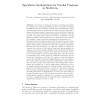Free Online Productivity Tools
i2Speak
i2Symbol
i2OCR
iTex2Img
iWeb2Print
iWeb2Shot
i2Type
iPdf2Split
iPdf2Merge
i2Bopomofo
i2Arabic
i2Style
i2Image
i2PDF
iLatex2Rtf
Sci2ools
117
click to vote
LCPC
2009
Springer
2009
Springer
Speculative Optimizations for Parallel Programs on Multicores
The advent of multicores presents a promising opportunity for exploiting fine grained parallelism present in programs. Programs parallelized in the above fashion, typically involve threads that communicate via shared memory, and synchronize with each other frequently to ensure that shared memory dependences between different threads are correctly enforced. Such frequent synchronization operations, although required, can greatly affect program performance. In addition to forcing threads to wait for other threads and do no useful work, they also force the compiler to make conservative assumptions in generating code. We analyzed a set of parallel programs with fine grained barrier synchronizations, and observed that the synchronizations used by these programs enforce interprocessor dependences which arise relatively infrequently. Motivated by this observation, our approach consists of creating two versions of the section of code between consecutive synchronization operations; one vers...
Barrier Synchronizations | Interprocessor Dependences | LCPC 2009 | Synchronization Operation | System Software |
Related Content
| Added | 26 Jul 2010 |
| Updated | 26 Jul 2010 |
| Type | Conference |
| Year | 2009 |
| Where | LCPC |
| Authors | Vijay Nagarajan, Rajiv Gupta |
Comments (0)

